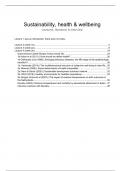Summary
Sustainability, Health & Wellbeing: Summary ALL literature, lectures and interview (2024)
- Course
- Institution
Summary for the Sociology course Sustainability, Health & Wellbeing at Tilburg University by Mine Kühn (2024). It contains notes from the lectures (including guest lecture), summaries from ALL the literature, summary of the interview. Fully in English. Literature: 1b: Huber et al (2011) | Ho...
[Show more]



